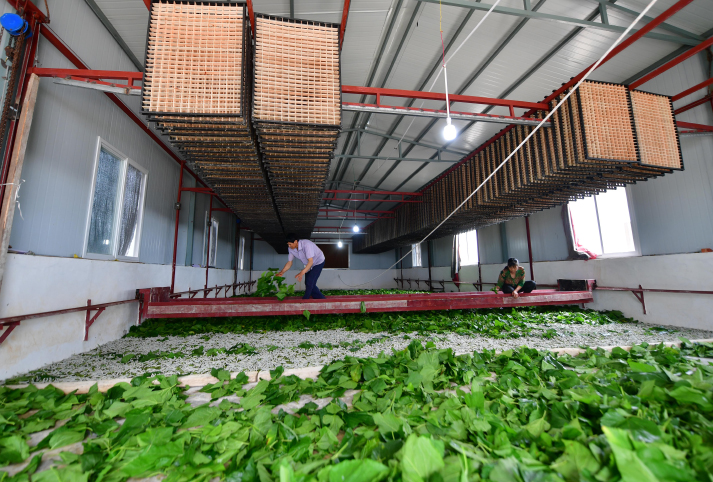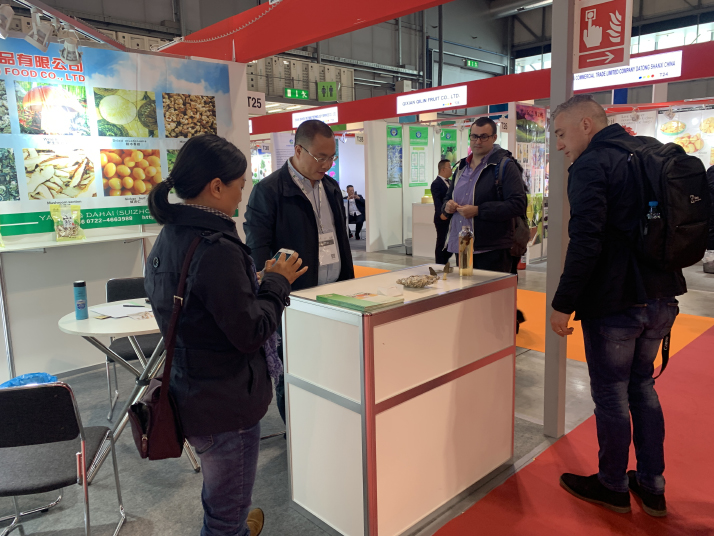|
||||||
|
||||||
| Home Nation World Business Opinion Lifestyle China Focus ChinAfrica Video Multimedia Columnists Documents Special Reports |
|
||||||
|
||||||
| Home Nation World Business Opinion Lifestyle China Focus ChinAfrica Video Multimedia Columnists Documents Special Reports |
| Nation |
| New plan lays down targets for modernizing agriculture and upgrading rural industries |
| By Lu Yan · 2020-08-04 · Source: NO.32 AUGUST 6, 2020 |
 Farmers feed silkworms at an industrial park in Shimen Village in Liuzhou, Guangxi Zhuang Autonomous Region in south China, on May 18 (XINHUA)
As a child, Qin Jing used to watch his father and other family elders grow mushrooms to make a living in the 1990s. Now 37 years old, he is the general manager of a mushroom processing and sales company in Suixian, a county under the city of Suizhou in Hubei Province, central China. Suizhou is one of the leading mushroom-growing regions. Qin has witnessed the development of the city's mushroom industry from traditional and small-scale to large-scale and technology-driven. Now he's part of it himself. "As the industry progresses, companies are adopting environment-friendly, high-yield and high-efficiency methods," he said. Established in 2008, his company grows mushrooms on around 2 hectares of land, hiring over 120 workers from local villages during the planting season. The annual yield can reach 2 million kg. Besides domestic sales, a considerable amount is exported to over 20 countries, such as Thailand, Malaysia and the Republic of Korea. Last year, Qin began to have the factories upgraded. He purchased several robots with an image recognition system. They can distinguish different mushroom varieties and sort them with fewer mistakes than humans. The robots cost Qin over 3 million yuan ($428,400). However, about 20 percent of that was subsidized by the government and in the long run, the robots will be cheaper with labor getting more and more expensive. Besides, in the first half of the year, when there was a shortage of workers due to the coronavirus epidemic, the robots met the pressing need, doing the work of people. "My company will continue to upgrade, becoming more intelligent in the coming years," Qin said. Tasks and targets Qin's company reflects the national plan to upgrade the agricultural industry. In July, the Ministry of Agriculture and Rural Affairs (MARA) released the 2020-25 plan on rural industry development. One of its main tasks is transforming the agricultural processing industry, which is an important part to accelerate the development of rural industries and lay a solid foundation for the modernization of agriculture and rural areas as well as all-round rural vitalization. China's agricultural product processing industry is relatively large. In 2019, the number of processing enterprises above the designated size was 81,000. Together they created more than 30 million jobs. However, the innovation ability of the industry is not strong, its quality and efficiency is not high, and there's much potential for further development, Zeng Yande, head of MARA's Department of Rural Industries, said at a press conference in July. "Technological innovation is the key to the transformation and upgrading of the industry," Zeng said. The plan envisions using new technologies and equipment for the development of the industry. It encourages research institutions, colleges and universities, and enterprises to jointly work on technological breakthroughs. The government will support institutions and companies that focus on research and development of smart processing equipment. By 2025, the agricultural products processing industry is planned to achieve a revenue of 32 trillion yuan ($4.57 trillion). In 2019, the figure exceeded 22 trillion ($3.14 trillion). In addition to upgrading the processing industry, the plan sets other goals for rural industrial development. Clusters of competitive rural specialty industries will be built. Specific targets have been set for agricultural tourism, crop production, forestry, livestock and fisheries. Online sales of agricultural products are another important goal. "Rural industries should seek integrated development that is farmer-centered, market-oriented, environment-friendly and innovation-driven," the plan says. However, there are barriers to achieving this. For example, with the epidemic affecting the global economic structure, China's rural industrial chain has not been immune. The mobility of resources like capital, technology, talents and infrastructure is not yet smooth enough. However, Zeng said the plan marks MARA's first attempt to formulate a comprehensive plan for the development of rural industries. It also focuses on addressing the problems facing rural industries and will guide more resources to the countryside, thereby facilitating rural industry revitalization.  Qin Jing (second left), General Manager of Yaoxingdahai (Suizhou) Food Co. Ltd., introduces mushroom products to visitors at a food exhibition in Milan, Italy, on May 6, 2019 (COURTESY PHOTO)
Attracting talents For Wu Jiayan, peaches are more than the specialty of her hometown, Yangshan in Wuxi, Jiangsu Province, east China. The fruit led to the romance between her grandparents, who were peach farmers for over 50 years. After graduation six years ago, the finance major decided to go back to Yangshan to take up her grandparents' legacy. In 2018, Wu, in her 20s, established a brand with support from the local government. She called it Honey Peach Couple, a reference to her grandparents. Currently, she has over 4 hectares of peach orchard, with an annual output value of nearly 300 million yuan ($43 million). Hundreds of college graduates like Wu have started their own businesses in Yangshan, galvanizing the underdeveloped local agricultural industries and helping the older generation of farmers to adopt advanced farming technology and be more competitive by selling on the Internet. "To develop rural industries we require a large number of innovative entrepreneurs who will be persistent and dauntless pioneers and create an entrepreneurial boom," Zeng said. The plan also envisions that the population returning or moving to rural areas to start businesses or pursue innovation will cross 15 million by 2025. The government will help construct industrial, processing, hi-tech, e-commerce and logistics parks in major farming regions to provide infrastructure and services to entrepreneurs. Mentoring teams will be formed comprising research talents, policy experts and other hi-caliber personnel from universities and research institutions. They will provide project guidance and other information to farmers and rural entrepreneurs, helping them in areas like marketing and brand building. Local service counters will be set up for rural entrepreneurs to go through the formalities and get business consultation. Besides, there will be training courses with field visits and successful entrepreneurs will be invited to the courses to share their stories and inspire. (Print Edition Title: Seeds of Change) Copyedited by Sudeshna Sarkar Comments to luyan@bjreview.com |
| About Us | Contact Us | Advertise with Us | Subscribe |
| Copyright Beijing Review All rights reserved 京ICP备08005356号 京公网安备110102005860号 |